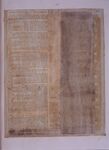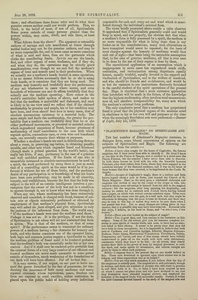 |
vol. title: Miscellaneous Scraps from January 1st 1878 vol. period: 1875-1878 pages in vol.: 153 |
"Blackwood`s Magazine" on Spiritualism and Magic
The last number of Blackwood's Magazine contains, in dialogue form, some liberal expressions of opinion on the subjects of Spiritualism and Magic. The following are quotations from the article:—
Belton—I have often sought for the house of Cagliostro, the famous magician, but I have never been able to identify it. He lived I know at one time in the Piazza di Spagna, and at another in a street near the Piazza Earnese, but the number I have never been able to discover. In both these houses he lived with his wife, the beautiful Lorenza Feliciani, after their return from Paris, where they were engaged in the notorious intrigue of the diamond necklace, and it was in the latter of these houses that they were arrested, to be imprisoned in the Castle St. Angelo.
Mallet—Apropos of Cagliostro’s magic, there is a curious and little-known legend about a gate in Rome, just beyond the Church of St. Maria Maggiore. Here, as the story goes, a celebrated alchemist and magician was invited to stay by the owner of the house or villa, who hoped to obtain some advantage to himself from his skill in the magical sciences; but the magician, after long enjoying his hospitality, and making no return for it, suddenly took French leave, leaving behind him a paper, on which were written certain cabalistic signs. These were inscribed by the owner over the gate, in a half faith that they might be efficacious in bringing him the good fortune he desired, and there they may be seen to this day, or rather they were to be seen there when I last passed that way. But so many changes are taking place in that quarter, that it is possible they may have been removed. Renmont tells this story, I believe, in his book on Rome, and “se non e vero, e ben trovato.”
Belton—Have you ever looked up the subject of magic?
Mallet—Yes; a good deal, and very curious is the literature on this subject. Some of the old writers give you, for instance, complete formulas to raise spirits of various kinds, and seem to have had an absolute belief in their efficacy. It seems to be pretty clear that they did have faith in these invocations; for it is impossible to believe that such men as Cardanus and Cornelius Agrippa, Aibertus Magnus, Johannes Bodinus, Pietro Abana, Hieronymus Fracastorius, Torreblanca, Debris, Pomponatus, and Varius, and men of that stamp, should have wilfully endeavoured to palm off on the world, with such calm seriousness, statements which they knew to be lies. At all events, they clearly profess their faith in the power of man, by magical processes, to raise the dead, and make spirits by incantation, and various receipts are given by them to effect such purposes.
Belton—I suppose that at the present day no one would believe in this. These men flourished in ignorant ages, when science was in its infancy, and when superstition was at its height?
Mallet—You are very much mistaken if you believe that the day of the magician is entirely past. The magical art is still cultivated, though in secrecy, and there are numbers of persons who still study it, practise it, and have faith in it. So, at least, I have been assured by men on whom I cannot but place trust, and who have declared to me that they themselves have attended magical seances, and employed the formulas of the magical books with successful results. Certain it is that the Abbe Constant devoted himself to the study of the magical arts and occult sciences, and under the pseudonym of Elephas Levi, wrote some remarkable books on the subject, and specially one on “La Haute Magie” which I recommend to you, if you are curious in such matters, There is no doubt, too, that a few persons were and are his disciples and pupils in France, and among them may be mentioned Desbarolles, the author of “Les Mysteres de la Main.” I must confess, however, that after reading “La Haute Magie” I was not very much enlightened on the subject. A great deal was hinted and insinuated, and vaguely indicated, but comparatively little directly taught either as to the theory orthe practice of magic.* A very accomplished and distinguished writer who lately died, assured me that he himself, on one occasion, by following certain prescribed formulas, evoked one of the spirits held by those who believed to be very dangerous—understand me, not by means of any medium, but by his own practice; and that he satisfied himself by this and other experiments that the prescribed processes were not by any means delusions, or follies. This same gentleman also told me, when I made a remark similar to yours, that I supposed no one in the present day believed in magical arts, that, on the contrary, he knew many who studied it, and believed in it. “Che volete,” as the Italians say. You may make out of this what you choose; I merely repeat what I have been told.
Mallet—As for the spirits, they are said to come up at tables by the late processes of incantation. They are, generally, so badly educated, and speak such bad grammar, that I don’t care for their company. I could stand any amount of bad grammar if they would only tell me something that we all of us do not know, and that we desire to know. To rap out by tedious processes feeble commonplaces of morality, and tawdry statements of future existence, which correspond solely to the vulgarest notions, or to advise us as to our conduct in copy-book phrases of evil communications corrupting good manners, does not pay. If what they said were really worth saying I would endure even the tediousness of their methods; but I cannot see that they have added to our literature anything very valuable. Shakespeare has so terribly degenerated at the table that I feel sorry to see that he has lost his mind in losing his body.
Belton—But you have had strange experiences, have you not?
Mallet—Very strange experiences, which I cannot explain, to my satisfaction, at least. But ail that were of any note were physical and material results; and I do not accept any spiritual explanation of them. But don’t let us talk about them now. They bore me, and they wouldn’t amuse you.
Belton—You seem to consider the fact of the utter triviality of all that is written and rapped at tables to be sufficient proof that it does not come from spirits. I agree with you in thinking that their utterances are not from the so-called spiritual world; but I do not see why we should expect spirits out of the body to have more intelligence than spirits in the body. We have no reason to think so. We know absolutely nothing in respect to the changes which take place after death. It may be that pure and refined spirits, freed from the body, ascend to higher existence, but in that case it is difficult to imagine that such spirits would return to rap out foolish statements at tables. But, on the other hand, there are many low, mean, contemptible spirits dwelling here in the flesh, to whom the body may lend apparent respectability, and, stripped of this garment which conceals their inanity of intellect and baseness of desires, they may fall in the scale of being, even below what they seemed here. Such spirits—of the earth earthy—would long for the gratifications of the sense and the flesh, and might be supposed to haunt the earth to which their desires cling, and grasp at any means of communication with it. Their heaven would be the heaven of the senses, and of the life they had lost, and one would naturally expect from them lies, hypocrisies, and deceit of every kind. Freed from the body, the naked spirit would be what it desired—the high and pure of aspiration would therefore ascend to loftier planes of existence, the mean and base might descend even to lower. I only suggest this answer to any argument against spiritual communications founded upon their triviality, feebleness, and absurdity, Let us clear our minds of distinctions between human beings and spirits; all our communications are spiritual. It is two spirits who talk together—not two bodies—here on earth. We have no warrant for the belief that the instant the spirit is freed from the body it necessarily leaves the earth—whatever be its condition—and becomes at once purified and beyond its influences. It may be or it may not be; but it is certainly a possible supposition that they whose whole happiness, while here, has been in the joys of the body, and whose desires have been mean and depraved, may only continue to be possessed by the same desires, and long to regain the body through which they obtained their gratification.
Mallet—It never struck me before in this light, but it certainly is an intelligible theory, whether it be correct or not.
Indian Mediums and Manifestations
...
<... continues on page 5-60 >
Editor's notes
Sources
-
London Spiritualist, No. 205, July 28, 1876, pp. 351-2

